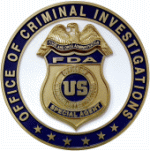Major Cases From U.S. FDA’s Office of Criminal Investigations In Fiscal Year 2018
 Created in 1991 in response to a generic drug scandal, the U.S. Food and Drug Administration’s Office of Criminal Investigations (FDA-OCI) was empowered by Congress to investigate violations of the Federal Food, Drug, and Cosmetics Act (FDCA), the Federal Anti-Tampering Act (FATA), and other related acts, as well as violations of USC 18 Crimes and Criminal Procedures. Over the years, FDA-OCI has conducted thousands of investigations across a wide range of criminal conduct, and fiscal year 2018 was as busy for them as ever. Here is a quick recap of just some of the major cases within the past year that FDA-OCI investigated:
Created in 1991 in response to a generic drug scandal, the U.S. Food and Drug Administration’s Office of Criminal Investigations (FDA-OCI) was empowered by Congress to investigate violations of the Federal Food, Drug, and Cosmetics Act (FDCA), the Federal Anti-Tampering Act (FATA), and other related acts, as well as violations of USC 18 Crimes and Criminal Procedures. Over the years, FDA-OCI has conducted thousands of investigations across a wide range of criminal conduct, and fiscal year 2018 was as busy for them as ever. Here is a quick recap of just some of the major cases within the past year that FDA-OCI investigated:
April saw perhaps one of the most high-profile cases of the year for counterfeit drug prosecutions: the sentencing in the CanadaDrugs.com case. It took years after the indictment of several companies and multiple employees, but justice finally arrived, and CanadaDrugs.com was permanently shut down a few months later. In July, a federal judge ordered a second Canadian company – Quantum Solutions – to pay a fine of over $4 million after the company and several employees were found guilty of distributing wholesale quantities of misbranded drugs to pharmacies and money laundering. Quantum Solutions sold those drugs on 241 different websites.
The counterfeit fentanyl pill crisis has also made its way into FDA-OCI investigations. July saw a life sentence handed to the Florida doctor who made the fake oxycodone pill that killed Maggie Crowley. In March, a jury convicted three Murfreesboro, Tennessee residents for their roles in producing counterfeit Percocet pills that killed one and sent another 20 people to the hospital in 2016. An FDA-OCI investigation led to the September 2018 indictment of a woman in San Diego, CA who allegedly sold over 50,000 counterfeit oxycodone pills via the internet, that contained fentanyl. One of those pills took the life of the youngest known fake fentanyl pill victim; ten-month-old Leo Holz.
Other FDA-OCI cases turned up different types of counterfeit pills. In February, a Palmer, Massachusetts man received 24 months in prison for illegally importing misbranded drugs from Pakistan. He purchased thousands of pills, including Ritalin, Percocet, hydrocodone, Adderall, and Restoril. Also in February, a trio in Florida received sentences for their roles in manufacturing counterfeit pills and steroids. In their lab, investigators found over 35,000 fake pills labeled as Viagra, Cialis, Accutane, and Clomid.
However, it is not just pills that consumers need to be careful about. Counterfeit cosmetic injectables are also a significant issue that can have devastating results. In July, the owner of multiple websites that sold $2.3 million in non FDA-approved and misbranded cosmetic injectables pleaded guilty in federal court. A Canadian pharmacist received a 36-month sentence in April for distributing counterfeit, misbranded and adulterated Botox to doctors across the country. In July, an investigation by FDA-OCI into a woman performing illegal silicone injections in southern Florida led to an indictment.
These cases represent a small fraction of what the FDA-OCI worked on this past year. It is because of the hard work of agents and officials here and elsewhere within the U.S. government that the United States continues to have one of the safest and most secure drug supply chains in the world.